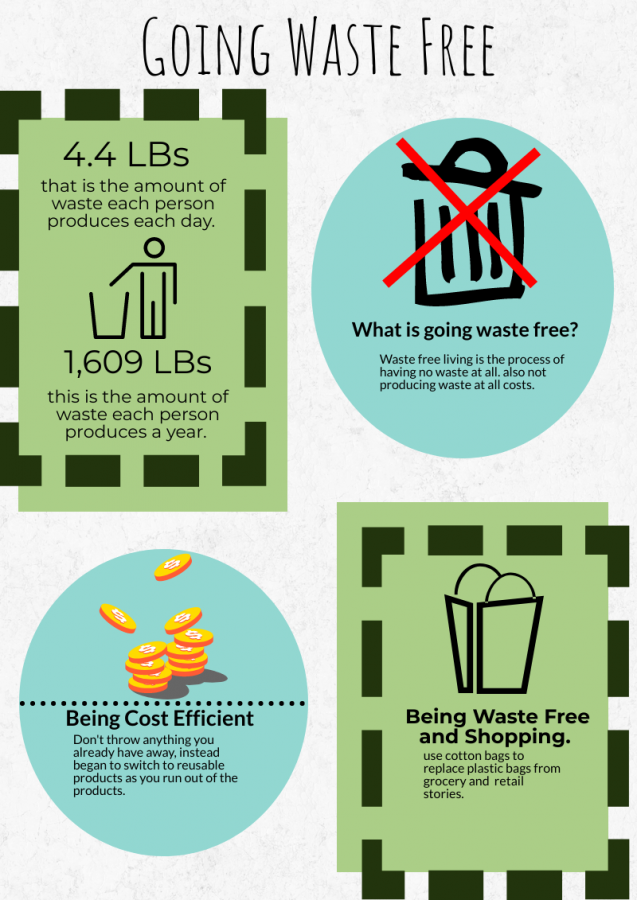Going Waste-Free
A new trend in the eco-friendly and organic culture has sparked some craziness.
Infographic of why, how, ways, and cost of being waste free.
What is waste-free living?
Waste-free living is the process of producing no waste at all (or as little as possible).
Why go waste free?
The average person throws away 4.4 pounds of trash a day and 1,606 pounds per year statics from https://www.saveonenergy.com/land-of-waste/. By going waste free you can decrease the amount of trash you are discarding, which in the long run can help with the slow rise of trash.
How do you begin going waste-free?
To start going waste-free, you need a goal/limit for the amount of trash you are allowed to produce at the beginning. A small mason jar or even a small dorm trash can should work fine. Being waste-free also means that you will need a lot of reusable bags for when you go to the grocery store or go shopping. Going waste-free is something you should not jump head-first into, so here are some tips for beginning to go waste-free.
Be Cost Efficient
Going waste-free doesn’t mean you have to go out and buy all new kitchenware or a whole new ethically-sourced wardrobe — it’s all about using what you already have, learning to recycle and reuse, and gradually moving towards a lifestyle that is kinder to the planet. One example of this is if you have just recently bought a pack of Ziploc bags, you shouldn’t just go throw them out. Instead, once the Ziploc bags run out or you have reused them for something, then you should switch to reusable sandwich bags. Also, when clothing becomes worn out and out of date, maybe make a blanket out of them, use them for rags, or donate them to someone in need before just throwing them in the garbage.
Being Waste-Free and Shopping
When going grocery shopping or clothing shopping, most people will frequently get plastic or paper bags. Because this would be considered producing waste, the best way to avoid having to accept these bags is to either buy a reusable bag from the store or to bring your own cotton or reusable bag each time you shop. It’s also recommended to bring your own mason jars or reusable containers and shop at more bulk, package-free stores so that you don’t bring excessive packaging home with you every time you simply have to buy a few groceries.
Small Ways to Become Waste-Free
First, lunch! Bring a lunchbox and use reusable bags or glass containers for your lunch instead of purchasing lunch each day at work or school. Next, your day-to-day empties may have to change, too. For example, items such as a stapler — staples are considered waste, so it might be smart to make a switch to a staple-free stapler (yes, this is real). A staple-free stapler binds the paper together by compressing the pages. And of course, use folders and bring a reusable water bottle instead of using cups or buying plastic, disposable water bottles.
*Remember!*
Being waste-free doesn’t happen overnight and will take a great deal of time. At the beginning, you don’t have to be completely waste-free. But, with a few simple changes to your daily routine and a little bit of passion for the planet, you can make a great deal of difference and will eventually get there!




